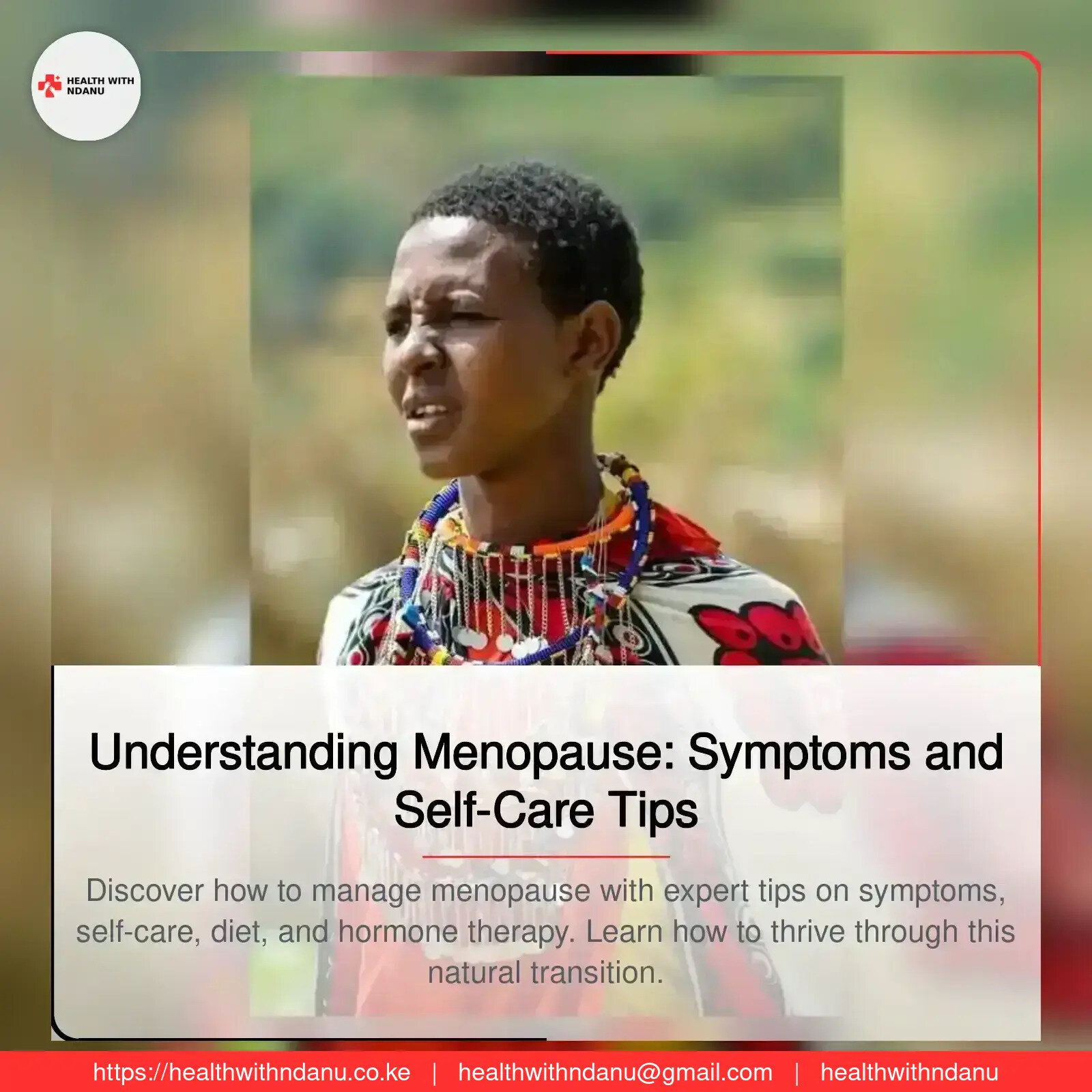Understanding Menopause: Symptoms and Self-Care Tips
- by Diana Ndanu
- 07 April, 2025
- 0 Comments
- 12 Mins



Introduction
Menopause is an inevitable part of a woman's life cycle, signifying the end of her reproductive years. It is a natural biological process that typically occurs between the ages of 45 and 55, although the exact timing can vary. For many women, menopause can be a challenging transition due to the range of physical, emotional, and psychological symptoms associated with it. However, with the right support and strategies, women can manage these changes effectively and embrace this stage of life with confidence.
In this guide, we’ll provide a detailed exploration of menopause—its stages, symptoms, and practical self-care tips to help women navigate this significant transition.
1. What is Menopause?
Defining Menopause and Its Natural Course
Menopause is not a disease but a natural phase in every woman’s life that marks the end of her menstrual cycles. It is diagnosed after a woman has gone 12 consecutive months without a period, and it signifies that the ovaries have stopped releasing eggs and producing estrogen, one of the key hormones responsible for regulating the menstrual cycle and various other body functions.
During menopause, hormonal fluctuations and the cessation of menstruation bring about various physical and emotional changes. These changes, while entirely natural, can cause discomfort and affect a woman’s quality of life. Understanding the stages of menopause, along with its symptoms, is crucial for managing this transition smoothly.
2. The Stages of Menopause
Menopause unfolds in three stages, each marked by distinct hormonal shifts and physical changes. Understanding these stages can help women anticipate and manage the symptoms more effectively.
a.) Perimenopause: The Transitional Phase
Perimenopause, often called the "menopausal transition," is the stage that leads up to menopause. It typically starts in a woman’s 40s, though it can begin earlier. During this phase, the ovaries gradually produce less estrogen, which causes various changes in a woman’s body.
Symptoms of Perimenopause:
- Irregular Periods: Periods may become shorter, longer, lighter, or heavier, and some women may skip periods altogether.
- Hot Flashes and Night Sweats: These sudden sensations of heat, often accompanied by sweating, are one of the hallmark symptoms of perimenopause.
- Sleep Disturbances: Hot flashes and other symptoms can interfere with a good night's sleep, leading to insomnia and restlessness.
- Mood Swings: Fluctuating hormone levels can cause irritability, anxiety, and depression.
- Vaginal Dryness: A decrease in estrogen can lead to dryness in the vaginal tissues, making intercourse uncomfortable.
- Decreased Libido: Many women experience a reduced interest in sex due to hormonal shifts and vaginal dryness.
Tip: Tracking your symptoms during perimenopause can be immensely helpful in identifying patterns and triggers. Use a journal or a period-tracking app to record changes in your cycle and any physical or emotional symptoms you experience.
b. ) Menopause: The Official End of Menstruation
Menopause is officially diagnosed when a woman has not had a period for 12 consecutive months. By this point, estrogen and progesterone levels have dropped significantly, and the ovaries no longer release eggs. This stage brings about a more significant reduction in reproductive hormone levels, resulting in changes to the body and emotions.
Common Symptoms of Menopause:
- Hot Flashes and Night Sweats: These symptoms often persist beyond perimenopause and may continue for several years.
- Vaginal Dryness and Discomfort: The lining of the vagina becomes thinner and drier, leading to discomfort during sex and increased susceptibility to infections.
- Urinary Incontinence: Hormonal changes can weaken the bladder, leading to issues with urinary control, especially during physical activity or sneezing.
- Changes in Body Shape: Weight gain, particularly around the abdomen, and a decrease in muscle mass are common during menopause.
- Sleep Problems: Difficulty falling asleep or staying asleep due to hot flashes and other factors can persist through menopause.
- Mood Fluctuations: Many women experience anxiety, depression, or irritability due to the hormonal changes and the emotional impact of this life transition.
Tip: As menopause approaches, it's important to talk to your healthcare provider about symptom management. There are options like hormone replacement therapy (HRT) and other medications that can help alleviate severe symptoms.
c.) Postmenopause: Life After Menopause
Once you’ve gone through 12 consecutive months without a period, you enter postmenopause. This stage marks the years after menopause, and many of the acute symptoms, such as hot flashes, may begin to subside. However, other symptoms related to long-term hormonal changes, such as vaginal dryness and decreased bone density, may persist.
Symptoms During Postmenopause:
- Vaginal Dryness and Atrophy: Reduced estrogen can cause the vaginal walls to become thinner, drier, and less elastic, which may lead to discomfort during sexual activity.
- Bone Health: Lower estrogen levels can contribute to a decrease in bone density, increasing the risk of osteoporosis and fractures.
- Heart Health Risks: With the decline in estrogen, women in postmenopause are at a higher risk for cardiovascular diseases, including heart disease and stroke.
- Increased Risk of Urinary Tract Infections (UTIs): The thinning of vaginal and urinary tract tissues can make women more susceptible to UTIs.
Tip: Even in postmenopause, it’s essential to maintain a healthy lifestyle. Regular check-ups with your healthcare provider will help manage risks related to bone health and cardiovascular health.
3. Common Symptoms of Menopause
While every woman’s experience of menopause is unique, certain symptoms are common across the population. These symptoms result from the dramatic hormonal fluctuations that occur during menopause and can significantly impact a woman’s physical and emotional well-being.
a.) Hot Flashes and Night Sweats
Hot flashes are one of the most common symptoms associated with menopause. They are sudden, intense feelings of heat that spread over the body, often causing sweating, rapid heartbeat, and a flushed appearance. Night sweats, which are hot flashes that occur during sleep, can cause disrupted sleep patterns and fatigue.
Managing Hot Flashes:
- Wear lightweight, breathable clothing to stay cool.
- Sleep in a cool room or use fans to help regulate temperature at night.
- Avoid triggers such as spicy foods, caffeine, and alcohol, which can make hot flashes worse.
b) Sleep Disturbances
Hormonal fluctuations can disrupt the body’s sleep-wake cycle, causing sleep disturbances and insomnia. Hot flashes and night sweats also contribute to interrupted sleep, leading to fatigue, irritability, and difficulty concentrating during the day.
Improving Sleep Quality:
- Maintain a consistent sleep schedule. Go to bed and wake up at the same time every day.
- Limit screen time before bed and engage in relaxing activities, such as reading or meditation.
- Create a cool sleep environment with fans, cooling pillows, or moisture-wicking sheets.
C) Mood Swings and Anxiety
Mood swings, irritability, and feelings of anxiety or depression are common during menopause. These emotional changes are largely due to the hormonal fluctuations that affect neurotransmitters in the brain.
Managing Mood Swings:
- Exercise regularly to release endorphins, which help improve mood.
- Practice relaxation techniques such as meditation, yoga, or deep breathing exercises to reduce stress.
- Talk to a therapist if you’re experiencing significant mood changes or feelings of depression.
d ) Vaginal Dryness and Reduced Libido
A decrease in estrogen during menopause can cause vaginal dryness and thinning of vaginal tissues. This can lead to discomfort during sex and reduced sexual desire.
Alleviating Vaginal Dryness:
- Use water-based lubricants to make sexual activity more comfortable.
- Talk to your healthcare provider about vaginal moisturizers or hormone treatments to help with vaginal dryness.
- Engage in open communication with your partner about your sexual needs and desires to maintain intimacy.
e.) Weight Gain and Body Shape Change
Many women experience weight gain during menopause, particularly around the abdomen. This change is due to hormonal fluctuations, a slower metabolism, and changes in lifestyle.
Managing Weight Gain:
- Eat a balanced, nutrient-rich diet that includes plenty of fruits, vegetables, and whole grains.
- Engage in regular physical activity, including both cardio and strength training, to help maintain muscle mass and boost metabolism.
- Prioritize sleep and stress management, as both can influence weight gain.
4. Self-Care Tips for Managing Menopause Symptoms
Menopause is not an ailment to be "cured" but a natural life phase that requires proper self-care. The following strategies can help ease menopause symptoms and improve overall well-being:
a.) Prioritize Nutrition for Hormonal Balance
A balanced diet plays a crucial role in managing menopause symptoms. Certain nutrients are especially important for supporting hormonal balance, bone health, and cardiovascular health during this time.
- Calcium and Vitamin D: These nutrients are critical for maintaining strong bones, especially as estrogen levels drop. Good sources of calcium include dairy products, leafy greens, and fortified plant milks. Vitamin D, which helps the body absorb calcium, can be found in fatty fish, fortified foods, and sunlight.
- Healthy Fats: Omega-3 fatty acids, found in fatty fish, flaxseeds, and walnuts, can help reduce inflammation and support heart health.
- Phytoestrogens: These plant-based compounds found in soy, flaxseeds, and legumes can mimic estrogen and help balance hormone levels. Incorporating these foods into your diet may alleviate some menopause symptoms, particularly hot flashes.
b.) Regular Physical Activity
Exercise is one of the most beneficial practices for managing menopause symptoms. Regular physical activity not only helps with weight management but also improves bone density, reduces the risk of heart disease, and boosts mental health.
- Cardiovascular Exercise: Walking, swimming, or cycling can help maintain heart health and prevent weight gain.
- Strength Training: Strengthening muscles through weightlifting or resistance exercises can combat the loss of muscle mass and bone density.
- Yoga and Stretching: These activities help reduce stress, improve flexibility, and relieve tension caused by physical discomfort.
c. ) Manage Stress Effectively
Hormonal fluctuations can heighten stress and anxiety during menopause. Implementing stress management strategies is essential for emotional and physical well-being.
- Relaxation Techniques: Meditation, deep breathing, and progressive muscle relaxation can help reduce stress levels.
- Mindfulness and Meditation: Practices such as mindfulness and guided meditation can help you stay calm and focused. Taking a few minutes each day to practice mindfulness can improve your emotional resilience and reduce anxiety or irritability.
- Social Support: Having a support system, whether it’s friends, family, or support groups, can be immensely helpful. Talking about your experiences and feelings with others who understand can provide comfort and reduce feelings of isolation.
d.) Hormone Replacement Therapy (HRT) and Other Medications
For some women, menopause symptoms can be severe and significantly affect daily life. In these cases, treatments like hormone replacement therapy (HRT) can be a solution. HRT involves taking estrogen or a combination of estrogen and progesterone to replace the hormones the body is no longer producing.
- Benefits of HRT: HRT can be effective in reducing hot flashes, night sweats, and vaginal dryness. It also helps prevent bone loss and reduces the risk of osteoporosis.
- Risks of HRT: While HRT can be helpful, it is not suitable for everyone. Women with certain conditions, such as a history of breast cancer or blood clots, may be advised to avoid HRT. It’s important to have a conversation with your healthcare provider to weigh the risks and benefits of this treatment.
Additionally, non-hormonal medications, such as antidepressants or gabapentin, are sometimes prescribed to manage hot flashes and mood changes.
e.) Sleep Hygiene for Better Rest
Since menopause often comes with disrupted sleep patterns, improving your sleep hygiene can help you get the restful sleep you need to function during the day.
- Sleep Environment: Create a cool, dark, and quiet sleep environment. Use blackout curtains, a fan, or air conditioning to keep the room temperature comfortable.
- Avoid Stimulants: Avoid consuming caffeine, alcohol, or large meals close to bedtime, as these can disrupt your ability to fall asleep.
- Develop a Relaxing Bedtime Routine: Establish a calming routine before bed, such as reading a book, taking a warm bath, or practicing relaxation exercises. This helps signal to your body that it’s time to wind down.
5. When to See a Doctor
Although menopause is a natural transition, some women may experience severe symptoms that interfere with daily life. If you find that your symptoms are unmanageable, or if you have concerns about your health, it’s important to talk to your healthcare provider.
- Severe Symptoms: If hot flashes, mood swings, sleep disturbances, or vaginal dryness are causing significant distress or affecting your quality of life, it’s worth discussing treatment options with your doctor.
- Postmenopausal Bleeding: If you experience bleeding after menopause, it’s essential to see a healthcare provider to rule out underlying health issues, such as uterine cancer.
- Bone Health: If you’re concerned about your bone density or osteoporosis risk, ask your doctor about screening tests and preventive measures.
6. Conclusion
Menopause is a natural phase in a woman’s life, and while it brings significant changes, it’s also a time for self-care and empowerment. By understanding the stages of menopause, recognizing symptoms, and adopting a healthy lifestyle, women can better navigate this transition with confidence. Whether it’s through diet, exercise, stress management, or medical treatment, there are many tools available to help you manage menopause effectively.
The journey through menopause can be unique for every woman, but with proper knowledge and self-care, this stage of life can be approached with grace and resilience. Embrace the changes, focus on your health, and seek the support you need to thrive in this new chapter of your life.
Call to Action:
If you found this article helpful, consider exploring more resources on menopause management, including articles on nutrition, exercise, and mental health. Don’t hesitate to reach out to a healthcare provider for personalized advice, as every woman’s experience with menopause is different.
Got Your Own Experience? Share with us
Popular Categories
Most Visited Blogs
Daily Newsletter
Get all the top stories from Blogs to keep track.



